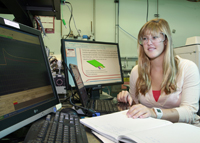Maryville College student Katherine Nadler is spending the summer at Oak Ridge National Laboratory (ORNL) conducting research that could aid the U.S. Department of Homeland Security in detecting vaporized explosives.
Nadler, a rising junior from Greensboro, N.C., who is majoring in chemical physics and mathematics, is completing a 10-week internship in ORNL's Biosciences Division. Funded by the Department of Homeland Security, Nadler’s internship allows her to work on a project that uses sensors to detect vaporized explosives.
The sensors resemble miniature diving boards that are coated in a specific compound that will bend when certain substances chemically or physically adhere to the surface, Nadler said. Using laboratory equipment, Nadler can detect how much the cantilevers bend to determine how much of the target substance is present in the air.
"The sensing technology being developed at ORNL is based on tiny structures called microcantilevers with dimensions as small as the cross-section of a strand of human hair," said Dr. Ali Passian, a member of ORNL's Nanoscale Science and Devices research staff and a research professor in the University of Tennessee's Department of Physics. "Due to their small size, these tiny devices can be extremely sensitive to very small quantities of chemicals in the air."
Nadler's team is developing a sensor that can detect dimethyl methylphosphonate (DMMP) molecules. DMMP can be used as a chemical weapon or used to produce the nerve gas sarin, Passian said.
If successful, the DMMP sensors can be placed at ports of entry into the United States, including airports and cargo docks.
"Port-of-entry inspection tools will be greatly aided by technologies that can non-invasively and accurately identify hazardous and illegal materials," Passian said.
Although Nadler's internship ends in mid-August, Passian said his department has requested an extension of her entry badge so she can continue to be part of the project and maintain her interaction with the lab.
"Molecule detection with microcantilever-based sensors can be experimentally challenging, requiring accurate control of the experimental conditions such as flow rate of molecules and electronics noise reduction," Passian said. "That's where Katherine really excels. She has an aptitude for understanding the big picture while focusing on fine details, both abilities required for sound investigative research."
Passian said it was unusual for an undergraduate student to have such a big impact on research conducted the lab.
"[Katherine's] creative thinking and excellent grasp of the project goals have been a tremendous contribution to the project," he said.
Dr. Mary Turner, Nadler's advisor, said she is very pleased with Nadler's placement at ORNL.
"Katherine is just a fantastic student," said Turner, an associate professor of chemistry at Maryville College. "She was placed at ORNL after only two years of college – most students usually do an internship after their junior year."
Nadler, who also plays volleyball for Maryville College, said her chemistry, physics and computer science courses at Maryville College have prepared her for the internship, but she also found that her speech class was extremely helpful – especially when she had to give a presentation in front of a small group of scientists.
She said her internship has been rewarding because not only is she able to work in a national laboratory using state-of-the-art technology and equipment, but she is surrounded by "brilliant scientists who are humble enough to answer my simple questions." She said the internship has opened her eyes to the fact that science "opens countless doors."
"There have been numerous occasions where I have just sat down with a few scientists and talked about their education paths or what it's like to work in industry versus research," said Nadler, who said she will remain on the same path toward research and will possibly pursue a career in engineering. “I’m learning new things daily, not only about chemicals and circuits, but about the daily life of a scientist."
She also said the hands-on experience has been invaluable.
"I've actually gotten to put together my experiment," she said. "I've searched throughout three labs to find the pieces to make sure the gases are flowing how I want, I've soldered resistors onto a circuit board, and I've run the data and created the graphs. There are not many places where you get this same hands-on opportunity."
Other Maryville College students who are participating in research at ORNL include:
- Anastasia Aksenova, a senior majoring in biochemistry, is working in ORNL's Biosciences Division. Her work involves characterizing the metabolite composition of plant and microbial samples associated with the Plant-Microbe SFA.
- Cameron Presley, a senior who is pursuing a double major in math and computer science, completed an internship in which he worked with the Environmental Protection Agency (EPA) and the Risk and Regulatory Analysis Group of the Environmental Sciences Division of ORNL. He participated in the creation of a web tool that helped risk assessors assess the contamination of areas affected by Radionuclide Dispersion/Improvised Nuclear Device events.
- David Korlin, a recent graduate who majored in writing/communications, has been working with ORNL’s Neutron Sciences Communications and Outreach Group creating an animation that would make visible the invisible machinations of the Spallation Neutron Source, an accelerator-based neutron source.
Maryville College is ideally situated in Maryville, Tenn., between the Great Smoky Mountains National Park and Knoxville, the state's third largest city. Founded in 1819, it is the 12th oldest institution of higher learning in the South and maintains an affiliation with the Presbyterian Church (U.S.A.). Known for its academic rigor and its focus on the liberal arts, Maryville is where students come to stretch their minds, stretch themselves and learn how to make a difference in the world. Total enrollment for the fall 2009 semester was 1,103.

